
Johnny Cash at San Quentin is the 31st overall album and second live album by American singer-songwriter Johnny Cash, recorded live at San Quentin State Prison on February 24, 1969, and released on June 16 of that same year. The concert was filmed by Granada Television, produced and directed by Michael Darlow. The album was the second in Cash's conceptual series of live prison albums that also included At Folsom Prison (1968), På Österåker (1973), and A Concert Behind Prison Walls (1976).
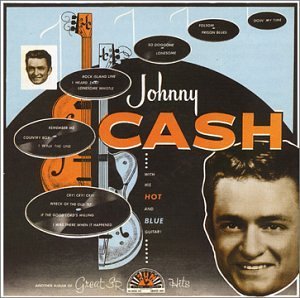
Johnny Cash with His Hot and Blue Guitar! is the debut studio album by American singer Johnny Cash, released on October 11, 1957. The album contained four of his hit singles: "I Walk the Line," "Cry! Cry! Cry!," "So Doggone Lonesome," and "Folsom Prison Blues." It was re-issued on July 23, 2002, as an expanded edition, under the label Varèse Vintage, containing five bonus tracks, three being alternate versions of tracks already on the original LP. In 2012, Columbia Records reissued the album with 16 additional non-album Sun Records tracks as part of its 63-disc Johnny Cash: The Complete Columbia Album Collection box set. In 2017, 60 years after the original release, the album was remastered under the title Johnny Cash with His Hot and Blue Guitar! . In 2022, Sun released a remastered edition of the original studio album, with only the original track listing. The songs had been remastered as to simulate being in the studio as the tracks were recorded.
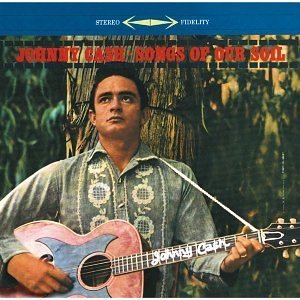
Songs of Our Soil is the fourth studio album by American singer Johnny Cash. It was originally released on July 6, 1959, and later re-issued on August 27, 2002 with two additional bonus tracks.
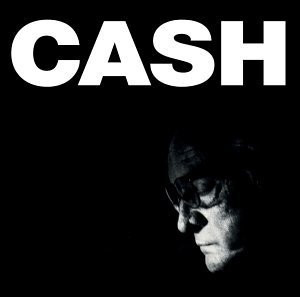
American IV: The Man Comes Around is the sixty-seventh and final non-posthumous studio album by Johnny Cash. It was released on November 5, 2002, by American Recordings and Universal Records. It is the fourth in Cash's "American" series of albums, and the last album released during his lifetime, and is considered some of his finest work towards the end of his life. The album was also included in the book 1001 Albums You Must Hear Before You Die.

Unearthed is a box set by American country singer Johnny Cash. It was released by American Recordings on November 25, 2003, two months after Cash's death. The album was compiled by Cash and Rick Rubin, who also produced the set. It was certified Gold on December 2, 2004, by the Recording Industry Association of America.

Johnny Cash Sings the Ballads of the True West is a concept double album and the 22nd overall album released by country singer Johnny Cash, released on Columbia Records in 1965. Covering twenty individual songs, the album, as its title suggests, contains various ballads and other songs on topics related to the history of the American Old West. This includes Carl Perkins' "The Ballad of Boot Hill", "Streets of Laredo", and the sole single from the album, "Mr. Garfield", describing the shock of the population after the assassination of President James Garfield. One of the songs, "25 Minutes to Go", would later be performed at Folsom Prison and appear on Cash's famous At Folsom Prison recording in 1968, while the melody of "Streets of Laredo" would be recycled for the song "The Walls of a Prison" featured on Cash's album From Sea to Shining Sea.
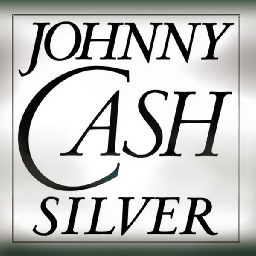
Silver is the 25th anniversary studio album by American country singer Johnny Cash, released on Columbia Records in 1979. It peaked at #28 on the Billboard albums chart. "(Ghost) Riders in the Sky" peaked at #2 on the singles chart; the two other singles, "Bull Rider" and "I'll Say It's True", had reached #66 and #42, respectively. Recordings of "Cocaine Blues" had previously appeared on At Folsom Prison and Now, There Was a Song!, under the title "Transfusion Blues" on the latter. The album was produced by Brian Ahern, who controversially introduced digital elements into the songs to the disapproval of some listeners. This is the last album that featured bassist Marshall Grant, longtime Cash collaborator in Tennessee Two. He departed from Cash's band the following year.

Gone Girl is an album by American country singer Johnny Cash, released on Columbia Records in 1978. It features the Rolling Stones' Beggars Banquet song "No Expectations", the original "It Comes and Goes" and Rodney Crowell's "A Song for the Life", as well as a version of Kenny Rogers' famous single "The Gambler", released just a month before Gone Girl. Three singles from the album, "Gone Girl", "I Will Rock and Roll with You" and "It'll Be Her", were released, but did not reach the country chart's top 20.
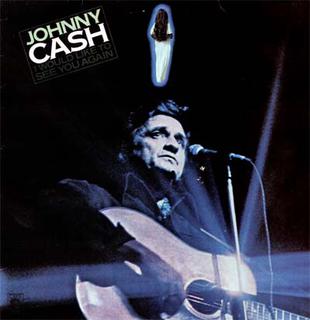
I Would Like to See You Again is an album by American country singer Johnny Cash, released on Columbia Records in 1978. The title track peaked at #12 on the singles chart, while "There Ain't No Good Chain Gang" reached #2; the album itself peaked at #23. The album features a pair of duets with Waylon Jennings, one of which was the "There Ain't No Good Chain Gang" single; it was one of Cash's first collaborations with Jennings, and the two recorded songs together throughout the 1980s, including a separate album entitled Heroes. Cash and Jennings would also work together as The Highwaymen with Willie Nelson and Kris Kristofferson.

A Thing Called Love is the 39th overall album by country singer Johnny Cash, released on Columbia Records in 1972. The title song, written by Jerry Reed, was released successfully as a single, reaching No. 2 on the country charts; two more singles charted as well, while the album itself also reached No. 2 on the country album charts. "A Thing Called Love" was re-recorded by Cash for Classic Cash: Hall of Fame Series (1988), while "Tear Stained Letter" was reprised on American IV: The Man Comes Around (2002). The Canadian pressing of this album has a different version of "Kate" with altered lyrics.
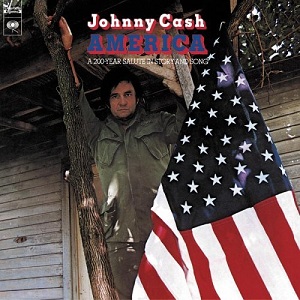
America: A 200-Year Salute in Story and Song is a concept album and the 40th overall album by country singer Johnny Cash, released on Columbia Records in 1972. As its title suggests, it comprises a number of tracks dedicated to the topic of American history, like several of Cash's other Americana albums. The record is a mix of songs and narration, in which Cash attempts to describe elements of the country's past, including famous personalities like Paul Revere or Big Foot. America also includes a re-recording of "Mr. Garfield" and "The Road to Kaintuck", songs previously released as singles in 1965 on Sings the Ballads of the True West. Most of the tracks on the album were written by Cash, with some exceptions, including a rendition of the well-known song "The Battle of New Orleans" and a reading of Abraham Lincoln's famous Gettysburg Address. The album was included on the Bear Family box set Come Along and Ride This Train.

The Last Gunfighter Ballad is an album by American country singer Johnny Cash, released on Columbia Records in 1977. Notable tracks include the title track, "Far Side Banks of Jordan" and "That Silver Haired Daddy of Mine", the latter of which features Cash's brother Tommy Cash. The title track was the album's only single, reaching #38 on the country charts; it tells the tale of an aging gunslinger who finds himself unable to deal with the modern way of life.

Johnny Cash på Österåker is a live album by country singer Johnny Cash released on Columbia Records in 1973, making it his 43rd overall release. The album features Cash's concert at the Österåker Prison in Sweden held on October 3, 1972. Its counterparts in concept are the more notable At Folsom Prison (1968), At San Quentin (1969), and A Concert Behind Prison Walls (1976). Unlike aforementioned, På Österåker does not contain any of Cash's most well-known songs; it does, however, include a version of Kris Kristofferson's "Me and Bobby McGee". "Orleans Parish Prison" was released as a single, faring rather poorly on the charts. Cash had previously recorded "I Saw a Man" for his 1959 album, Hymns by Johnny Cash.

The Johnny Cash Family Christmas is the 41st overall and second Christmas album by country singer Johnny Cash, released on Columbia Records in 1972. It is his second Christmas album, the first one being the 1963 release entitled The Christmas Spirit. The album includes less original Cash material than its predecessor and contains narrations and dialogue featuring his family and friends, between tracks. In all, three songs were written or co-written by Cash, while two, "Christmas as I Knew It" and "Silent Night", had been featured on The Christmas Spirit. June Carter Cash, Marshall Grant, Tommy Cash, Harold Reid, Larry Butler, Maybelle Carter, Anita Carter, Carl Perkins and Lew DeWitt are among those featured on the album.

Strawberry Cake is a live album and 53rd overall album by American singer Johnny Cash, released on Columbia Records in 1976. The album includes numerous pieces of between-song stage banter. The album includes several of Cash's most well-known early songs, such as "Big River", "I Still Miss Someone" and "Rock Island Line", as well as a number of more obscure compositions, some of which were performed by Cash for the first time; this includes "Strawberry Cake" and "Navajo". The title track was released as a single, but did poorly on the charts, peaking at No. 54.

The Junkie and the Juicehead Minus Me is the 48th album by country singer Johnny Cash, released in 1974 on Columbia Records. Although credited to Cash alone, the album includes solo performances by his daughter Rosanne Cash, and stepdaughters Rosie Nix Adams and Carlene Carter, predating the launch of their own solo careers. Two songs on the album were written by Kris Kristofferson, while "Don't Take Your Guns to Town" is a re-recording of a highly successful Cash single, his first smash hit for Columbia from back in 1958. "Father and Daughter " is a cover version of a well-known Cat Stevens song and a duet with Cash's stepdaughter, Rosie Nix Adams, with slight changes in lyrics; a version of the same song would be released in 2003 on Unearthed, as a duet with Fiona Apple. June Carter Cash also performs a solo track without her husband, one of only a couple of occasions where she did this on a Johnny Cash album outside of concert recordings.
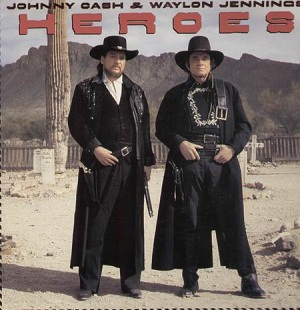
Heroes is a duet studio by American country music singers Johnny Cash and Waylon Jennings, released on Columbia Records in 1986.

The Legend is a box set by country singer Johnny Cash, released in 2005 on Columbia Records and Legacy Recordings. It is one of the few multi-disc sets that contain songs recorded throughout Cash's entire career, from 1955 to 2003. Over four CDs, most of Cash's biggest hits are covered, in addition to numerous traditional compositions Cash recorded versions of, and several collaborations with other known artists, including Rosanne Cash, U2 and Bob Dylan. In keeping with Cash's persona as the Man in Black, the data surface of the discs is black. In 2006, the set won the Grammy Award for Best Boxed or Special Limited Edition Package. It was certified Gold on January 11, 2006, by the RIAA.

Fat Albert Rotunda is the eighth album by jazz keyboardist Herbie Hancock, released in 1969. It was Hancock's first release for Warner Bros. Records after his departure from Blue Note Records. The music was originally done for the TV special Hey, Hey, Hey, It's Fat Albert, which later inspired the Fat Albert and the Cosby Kids TV show.
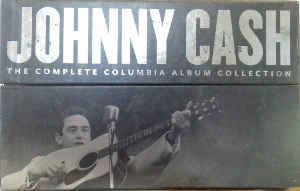
The Complete Columbia Album Collection is a box set by country singer Johnny Cash, released posthumously in 2012 on Columbia Records and Legacy Recordings.




















